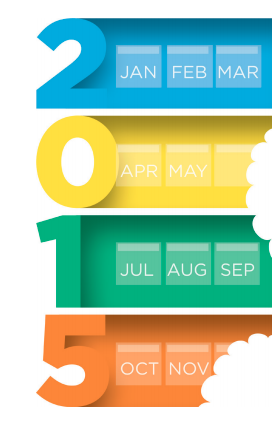By Kimberly Manning
It’s human nature to embrace new beginnings, a fresh start and the possibility of a different, better and more successful life. As the clock strikes midnight each new year, people set their goals and venture into the next calendar year with high hopes and excitement. Unfortunately for many, their goals go unachieved. In a culture where reality television glorifies becoming rich and famous or losing massive amounts of weight in just a few months, setting a yearly goal can be daunting.
At the end of 2013, I wasn’t in a good place: unemployed after leaving my dead-end job without one to replace it, depressed, unhealthy and unmotivated. With just a few weeks left in December I accepted a job that would begin Jan. 2. I was thrilled to start a new year fresh and was motivated to change other aspects of my life.
Setting and following through with a New Year’s resolution was never an easy task for me. I set my sights too high and fell too quickly. But this year something needed to be different. I vowed to change my daily habits slowly, inch by inch, quarter by quarter.
Instead of setting one resolution to keep for 12 months, I decided to set four, three-month mini resolutions that I would build upon as the year progressed. These resolutions would be easy, almost too easy, to achieve, leaving little room for disappointment and plenty of room for growth and achievement.
On Jan. 1, I started with my first quarter-year resolution of eating at least one serving of raw or uncooked fruits or vegetables. Seems too easy, right? For those who eat fresh produce regularly, this may seem like a cop-out, but my daily intake of fresh fruits and vegetables at the end of 2013 was almost nonexistent.
On April 1, I added drinking at least one cup of tea, hot or cold, each day, followed by incorporating flossing into my everyday regimen starting July 1. For my final quarter-year resolution I vowed to remove Facebook from my phone, which was the first goal I set that would eliminate something from my daily routine—yes, I checked Facebook on my phone daily, even multiple times a day.
By setting these small goals, I was able to refine my habits. I had to purchase fresh fruits and vegetables every time I went to the grocery store. I eliminated my afternoon coffee—a habit I had previously been unsuccessful in breaking—and replaced it with a cup of tea. My teeth felt unclean whenever I went without flossing. I found myself keeping my phone in my bag to and from work, focusing on one thing at a time. And as time went on, I added even more fresh produce and multiple cups of tea, although I must admit I still dislike flossing and continue to only do it once a day.
My purpose of cutting my New Year’s resolution into bite-sized chunks was so it wouldn’t be scary and I wouldn’t set myself up for failure. And I didn’t. In fact, I set myself up for more success than I had imagined. Looking for new goals to set, I feel more confident than I ever have before, healthier and happier. By adding these things into my routine, I took out the habits that I could have never simply given up. The mind is a powerful thing, and it can work with you or just as easily work against you. Tricking the mind by adding in good habits slowly eliminates the bad because there’s simply no room for it. Promise to eat an apple before you have a cookie and that apple could curb the initial craving. Of course it’s not always that easy and slip ups are bound to happen. But accepting them and moving forward without shame or regret is equally as important in meeting the final goal.
Incremental change isn’t the most glamorous or exciting, but it’s rewarding to meet a goal. If that goal is unattainable, you may feel worse than if you hadn’t even set it. Miniature goals over the span of a year, five years, 10 years, adds up to a whole lot. Seeing the steps lined up in front of you to meet the finish line gives you more power to haul through the race.
Make over your yoga practice
Yoga in the Western world has become a practice of reversing the effects of daily life: sitting at a desk for 40-some hours a week, hunching over the wheel of a car, typing on a computer, walking in heels. We do damage to our bodies daily. This is why yoga is so important, and remembering to tune into the subtle body is key. Here are some tips to help you affect positive change in your yoga practice.
Remember the “Aha!” moments
It’s that moment when something clicks in the body. Something you’ve been trying to obtain for months, weeks or maybe even years finally happens. These little “aha” moments are the hook that draws yogis in, even if those moments are few and far between. Those subtle actions build upon one another over time, and in an instant everything comes together and makes sense.
Listen to cues
Sometimes yogis are so into their practice they tend to tune out the cues the teacher is giving. While it’s wonderful to focus deeply on the sensations and movements in the body, tuning into the teacher’s cues can provide valuable information that can bring you deeper into the pose.
Notice the feeling, not the look
It’s easy to compare yourself to fellow yogis in a class, but the power that comes from not comparing yourself will bring you deeper inside. It’s important to know that everyone is on a different path in their yogic journey, all with different baggage. Each time you step onto the mat, take inventory of the way your body feels. Think granular, scanning your muscles, bones and joints. Then as you move through practice, notice what feels different, better or worse.
Kim Manning is a content marketing strategist at a technology company and a yoga teacher. She loves finding new ways to be creative, both on and off the mat.























No Responses to “The Quarter-Year Resolutions: Cutting a year into bite-sized chunks”